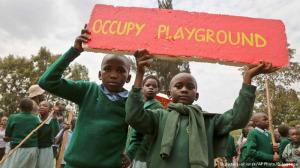By Kathryn Maureen Ryan
Impunity Watch, Managing Editor
BANGUI, Central African Republic –United Nations-mandated investigators warned on Wednesday that war crimes are currently being committed in the Central African Republic and called for the establishment of a ‘truly international’ tribunal with international judges who could objectively investigate and prosecute perpetrators of such crimes in the war torn country on both sides of the ongoing conflict in the African nation. Law professor Philip Alston, member of the International Commission of Inquiry on the Central African Republic, warned against a proposal being discussed by the United Nations to establish a special criminal court in the country arguing that the Central African Republic does not have the capacity to handle such cases. Alston argued the country lacks judges with the independence and the ability to hold accountable the major political leaders who would likely be prosecuted by such a tribunal.

International Commission of Inquiry on the Central African Republic was established up by the United Nations Security Council in 2013 with a mandate to probe reports of human rights violations in the Central African Republic, which has been engaged in a protracted civil war. The commission was mandated with compiling information and helping identify the perpetrators of potential human rights abuses. The commission is scheduled to release its most recent report to the Security Council tomorrow. Commissioner Alston said that the latest inquiry which was conducted over the strongly recommends the establishment of accountability mechanisms in order to identify the ‘cycle of impunity’ in the Central African Republic.
Two of the Commission’s three members have warned that unless the international community pays more attention to the ongoing siltation in the Central African Republic and works to hold the perpetrators of human rights abuses accountable, the situation in the country could intensify and even spiral into genocide. “We are here to say that we make some recommendations to the Security Council and Secretary-General but also to the African Union and the CAR Government,” said Commissioner Fatima. M’Baye, adding that: “We think that for the conflict in CAR not to grow even more, the international community must act fast against those who abuse human rights law and humanitarian law.” Fatima. M’Baye also said that the Commission has listed the perpetrators of abuses whom they are sure “are implicated in the ongoing conflict in the Central African Republic.” She also added that this list will be handed over to the United Nations Secretary-General Ban Ki-moon, she said.
The Central African Republic has seen more than two years of civil war and sectarian violence which has displaced thousands across the country. According to the estimates of the United Nations, nearly 440,000 people remain internally displaced and 190,000 have become refugees seeking asylum across international borders. In December of last year, Under-Secretary-General for UN Peacekeeping Operations Hervé Ladsous warned of a potentially explosive situation in the African nation amid continuing violent clashes between the Séléka alliance, a majority Muslim group, and the majority Christian anti-Balaka militia.
For more information please see
ABC News – International Court Urged For Central African Republic – 21 January 2015
International Business Times – How European, Chinese Weapons Fuel Conflict In Central African Republic – 21 January 2015
United Nations News Centre – Central African Republic: UN Investigators Urge Establishment of War Crimes Tribunal – 21 January 2015
Reuters – U.N. Worker Kidnapped In Central African Republic: Mission – 20 January 2015


